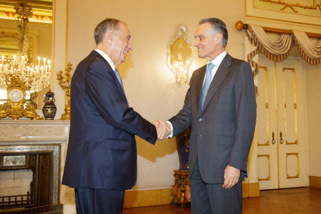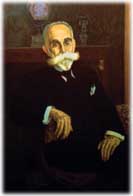
 Bernardino Luis Machado Guimarães
Bernardino Luis Machado Guimarães
Born in Rio de Janeiro on 28 March de 1851, son of António Luís Machado Guimarães and his second wife Praxedes de Sousa Guimarães.
In 1860 the family returned to Portugal and settled in Joane, municipality of Famalicão. His father was made 1st baron of Joane. On reaching his majority in 1872 he opted for Portuguese nationality.
In 1882 he married Elzira Dantas, daughter of Councillor Miguel Dantas Gonçalves Pereira, with whom he had eighteen children.
He died on 28 April 1944.
PROFESSIONAL ACTIVITY
He completed his secondary education in Oporto and enrolled at Coimbra University in 1866 to study mathematics and philosophy.
In 1873 he graduated in philosophy and on 14 January 1875 submitted and defended a paper entitled “Mechanical Theory of the Reflection of Light”.
On 28 February 1877 he was appointed professor at the philosophy faculty to which he had applied in 1876 with a work entitled “Mathematical Theory of Interferences”.
On 2 July 1877 he obtained his PhD with the thesis “Deduction of the Laws of Small Elastic Movements”.
On 17 April 1879 he was appointed lecturer in the chair of philosophy and taught various subjects. After 1883 he was exclusively responsible for anthropology. That same year he graduated in General Zoo-technical Agriculture and Rural Economy.
In 1890 and in 1894 he was appointed a peer of the realm by the professors of Coimbra University.
In 1892 he joined the Higher Council of Public Instruction.
Directed Lisbon Commercial and Industrial Institute.
Represented Portugal at the Tercentenary Celebration of Christopher Columbus held in Madrid, and at Hispano-Luso-American Pedagogical Conference, also held in Madrid.
In 1894 he was president of Coimbra Institute.
On 12 April 1897 he was president of the Pedagogical Conference organised by primary school teachers and held in Lisbon.
During the 1907 academic crisis he sided with the students and was forced to resign his post as professor at Coimbra University.
POLITICAL CAREER
Bernardino Machado’s political activity unfolds along two main lines: his actions within the freemasons and his public office. In the first case, he begins with the "Perseverança" lodge in Coimbra in 1874. Within the Grande Ocidente Lusitano he held the following posts:
President of the Council of the Order between 1892 and 1895;
Grand Master between 1895 and 1899;
Member of the following lodges: "Razão Triunfante", "Elias Garcia", "Fraternidade Colonial" in Lisbon and "Fernandes Tomás" in Figueira da Foz;
Supported the Supreme Council of Degree 33 in 1914 when it split from the Masonic Movement, but returned to the Grande Oriente Lusitano Unido in 1920; - Sovereign Grand Commander of the Supreme Council of Degree 33 from 1929 until his death.
His political activity began in 1882 when he was elected Member of Parliament of Lamego for the Regenerating Party.
In 1886 he was again elected but by the Coimbra constituency.
In 1893 he joined Hintze Ribeiro’s government, as Minister of Public Works, where he was involved in drawing up legislation protecting the work of women and minors. The Court of Arbitrators was created at this time considered by some as being the first employment tribunal.
He joined the Republican Party on 31 October 1903 and presided over the directorate between 1906 and 1909.
With the implantation of the Republic on 5 October 1910 he was appointed to some of the highest positions in the country’s political hierarchy:
Foreign Minister of the Provisional Government;
Deputy to the Upper Chamber until 1915;
Candidate to the Presidency of the Republic in the 24 August 1911 elections, in which Manuel de Arriaga was elected by 121 votes against 86;
Minister and Ambassador to Brazil from 20 January 1912;
President of the Ministry, Foreign Minister and Interior Minister between 9 February and 23 June 1914;
President of the Ministry and Minister of the Interior from that date until 12 December 1914. Acting Minister of Justice until 22 July;
President of the Republic, elected on 6 August 1915 by 134 votes against 18 for Correia Barreto. Deposed following the movement led by Sidónio Pais and expelled from the country. Returned to his political activity when the Sidónio Pais era ended:
Elected senator in 1919;
President of the Ministry and Minister of the Interior from 2 March to 23 May 1921; acting Minister of Agriculture in the same Ministry until 4 May;
Candidate to the Presidency of the Republic in the 6 August 1923 elections, in which Manuel Teixeira Gomes was elected by 121 votes against 5 for Bernardino Machado;
President of the Republic from 1925 following the resignation of Teixeira Gomes. Elected with 148 votes. He did not end his term of office which was interrupted by the military movement of 28 May 1926.
ELECTIONS AND PRESIDENTIAL PERIODS
Bernardino Machado was the 3rd and the 8th President of Portugal, having twice been elected President. In the first period for the 1915-1919 four-year term, and in the second period for the 1925-1929 four-year term. He did not complete either term, the first because of the movement by Sidónio Pais and the second because of the military movement of 28 May 1926.
1st Period
Elected at the special Congress session of 6 August 1915, two months (60 days) before the end of the previous presidential term by imposition of article 38 of the 1911 Constitution. 189 congressmen voted in the first round and the results were as follows:
Bernardino Luís Machado Guimarães 71 votes
António Xavier Correia Barreto 44 votes
Aílio de Guerra Junqueiro 33 votes
Duarte Leite Pereira da Silva 20 votes
Augusto Alves da Veiga 4 votes
Pedro Martins 1 vote
José Caldas 1 vote
Blank votes 15
As none of the candidates had sufficient votes, there was a new ballot with the following results:
Bernardino Machado 75 votes
Correia Barreto 45 votes
Guerra Junqueiro 30 votes
Duarte Leite 19 votes
Alves da Veiga 2 votes
Blank votes 12
As none of the candidates obtained a two-thirds majority, a new election was held between the first two candidates, where Bernardino Machado got 134 votes and Correia Barreto 18 votes, with 27 blank votes.
He took office and swore fidelity to the Constitution of the Republic at 14h40 at the session of Congress of 5 October 1915.
During his term in office he swore in two governments under Afonso Costa, which governed from 29 November 1915 to 15 March 1916, and then from 25 April to 8 December 1917, and one under António José de Almeida who led the government known as “Sacred Union” between 15 March 1916 and 25 April 1917.
Neither was capable of stopping the social unrest and there were strikes and demonstrations against the governments in January 1916, a farmers’ strike in October of that year, the strikes of 19, 20 and 21 May 1917 with 22 people dead in Oporto, and one on 22 May, which led to the state of siege on 12 July.
The situation had been aggravated by the development of events linked to the 1914-1918 war. Germany had declared war on Portugal on 9 March 1916, when German merchant ships had been seized. The pro-war factions rejoiced as the country finally entered the conflict.
On 8 June of that year Afonso Costa went to Paris to take part in the Allied Conference. On 22 July the Portuguese Expeditionary Corps was set up in Tancos under General Norton de Matos. On 30 January 1917 the first brigade left for France under Colonel Gomes da Costa and the second departed on 23 February.
In October Bernardino Machado himself visited his soldiers in France and then extended his visit to England.
It was during these highly disturbing times that Manuel de Arriaga died on 5 March 1917, the Fátima apparitions occurred on 13 May and 13 October and that a new party was formed on 20 October, the Republican Centrist Party, in favour of discipline, law and order, even at the cost of freedom.
The country was ripe for rebellion and on 5 December, at the head of a military junta, Sidónio Pais dissolved Congress and deposed the President of the Republic. Afonso Costa was arrested and Bernardino Machado forced to leave the country.
The times of Sidónio were about to start.
2nd period
After Manuel Teixeira Gomes’ resignation Bernardino Machado was again elected President of the Republic on 11 December 1925.
In the first ballot, with 170 congressmen, the following results were obtained:
Bernardino Machado 124 votes
Duarte Leite 33 votes
Gomes Teixeira 5 votes
Betencourt Rodrigues 1 vote
Belo de Morais 1 vote
Afonso Costa 1 vote
Jacinto Nunes 1 vote
Blank votes 4
In view of these results there was a second ballot with 160 names where Bernardino Machado was elected with 148 votes against 5 for Duarte Leite, 1 for Betencourt Rodrigues. There were 6 blank votes.
His term of office lasted for a short period only and there was only one head of government, António Maria da Silva.
There were many military coups. In February 1926 one such was led by Martins Júnior and Lacerda de Almeida. Gomes da Costa had been on the receiving end of invitations since the beginning of the year. It was already possible to foresee the military coup that took place on 28 May 1926.
POST-PRESIDENTIAL ACTIVITIES
After handing over his presidential powers to Admiral Mendes Cabeçadas on 31 May, he remained in Portugal until the defeat of the revolts of 3 and 7 February 1927, after which he was again expelled. He first went into exile in Galicia and then in France, where he continued to fight against the regime in Portugal.
His return was authorised in June 1940 when the Nazis invaded France. Having been forbidden to live in Lisbon he settled in the Douro region and died there on 28 April 1944, on the day of Salazar’s 55th birthday.
MAIN WORKS
Machado had a vast output and it reconstitutes his various activities. Thus, A Introdução à Pedagogia, 1892, O Ensino, 1898, O Ensino Primário e Secundário, 1899 and O Ensino Profissional, 1900, produced conclusions on his teaching experience.
Pela Liberdade, 1900, Da Monarquia para a República, 1903, Conferências Políticas, 1904, Pela República, 1908, and A Irresponsabilidade Governativa e as Duas Reacções Monárquica e Republicana, 1924, reflect his political thinking.
O Ministério das Obras Públicas, 1893, A Indústria, 1898, A Agricultura, 1900, Os Meios de Comunicação e o Comércio, 1903, and No Exílio, 1920, are corroborative examples.
© 2006-2016 Presidency of the Portuguese Republic
You have gained access to the records of the Official Site of the Presidency of the Republic from 9 March 2006 to 9 March 2016.
The contents available here were entered in the site during the 10 year period covering the two mandates of President of the Republic Aníbal Cavaco Silva.